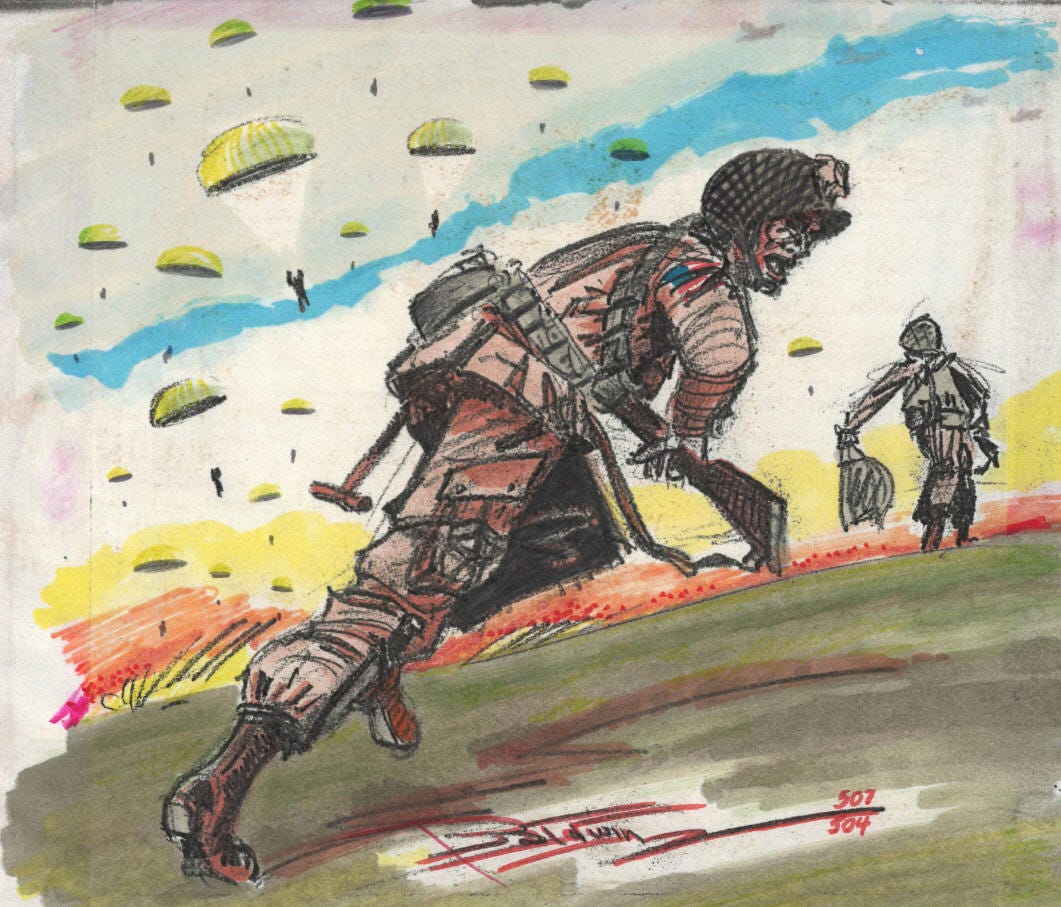Devils in Baggy Pants: What's in a Name?
Wrapping Up "A Rifle Squad in the Valley"
The brisk cold air, laden with tint of pine, seemed it was made to pierce any garment the Army made. That is, if one were to judge it by the infantryman’s stick. Twenty below! they decried — it was really 20 or thereabouts — when Major Freeman lead them head first in a crossing of McKellars Lake. It was one of the more distinctive exercises on Fort Bragg. Coolyconch had survived more stormings than a German trench. Hikes of olympian duration left no solitary tree to the imagination. It was this dull and hollow time spent on trite feet that men so associated with training. No point on the map was left untouched, or so it seemed.
It was this physical endurance their colonel commanded like Zeus lightning. Colonel Tucker wielded it against the Germans not in a dramatic way like Zeus, but in a way that gradually eroded the German position in Italy’s Volturno Valley. Like the rote marches at Fort Bragg, they found mountain climbing a chore, often dull. But, like those marches a year before, it served a higher purpose.
Come morning, the Germans in the village found themselves with a decision to make – stay and rot, or withdraw. They always withdrew and the paratroopers were able to inflict casualties in a one-sided battle as they vacated.
Of course, the average parachute infantryman knew little of the greater purpose he was serving. He simply knew he was climbing up hill, and Germans were ‘out there.’ War and battle was a personal endeavor. Ross Carter, poet laureate of the Devils, explained it as such: “Over a large area little scraps are taking place with men suffering, fearing and dying in them, and the loosely connected little scraps taken together constitute a battle. The war, to the dogface dodging mortar shells, is concentrated on him. He judges the nature of combat by his own relation to it. Thus battle becomes a very personal thing. If he gets killed, the war is over; if he lives, the war goes on. It becomes personally important therefore to the front line infantryman that the war for him continue!”1
That made the Dutch hamlet of Im Thal someplace very personal to Ross Carter. He likely did not know the broader reasons he was sent to Im Thal — where for him the war might have ended — but they underpinned how the regiment was to fight the famed Holland campaign.
A probe of the conditions that sucked the regiment’s rifle squads into this small hamlet offers a revealing look at the larger campaign’s conduct. Chief among them was terrain. No factor was more decisive on how the regiment’s squads experienced Operation Market Garden. Fundamentally, it was a fight over fields of fire.
The regiment’s participation in Operation Market Garden is defined in lore by the Waal River crossing, a spectacle of will dramatic in its culmination. Rightfully so. Yet it belies the proficiency of the rifle squad — skilled in night action, and prior to the green-tinged days of NODs. This was small unit tactics at peak performance. It was another lore, birthed in Anzio and recast in Holland. The aggressiveness, the endurance, the persistent presence were visible fruit. The soil that bore it out was composed of spirit and faith, skill and discipline.
They trained, climbed, and patrolled for larger purposes typically unknown, yet they went out and made a name for themselves, in the Volturno Valley, Im Thal, and in dozens of other scraps.
This is what’s in a name — “Devils in Baggy Pants.”
Part 1: The Impossible Patrol
Each successive patrol ran into heavier oppositions from the enemy, and each had a shorter distance to cover before they tangled with machine guns, machine pistols, mine fields and barbed wire. In short, the enemy had developed their defenses to such a point that our patrols were getting nowhere.
Part 2: The Impossible Patrol
The great caper of thievery fell on Lieutenant Reneau Breard. It would be his job to get the men in close and snatch a live German to bring back.
Carter, Ross S. Those Devils in Baggy Pants. Buccaneer Books. p. 114







ANGEL IN BAGGY PANTS 11 TH AIRBORNE!!!!!